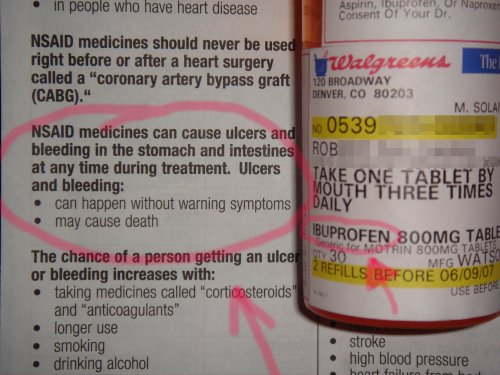Talking to your doctor about supplements
Sooner or later, most supplement users are going to find themselves talking to their doctor about the supplements they take. Hopefully, they’ve found a physician who, at least, embraces the use of non-controversial supplements like fish oil, glucosamine and vitamin D to protect health. Better still if the doctor is already knowledgeable and familiar with a range of supplements as some are. But most people don’t have doctors like that. So when it comes time to talk to the doctor about the supplements a patient uses or wants to use, the conversation usually goes nowhere. But it doesn’t have to be that way. Even if you don’t have the most supplement-friendly doctor, if you prepare for and handle that conversation the right way, you can make your doctor a positive part of your supplement regimen, instead of an antagonist.
It’s never been a secret that most doctor’s aren’t knowledgeable about supplements. Yet every supplement label says to check with a doctor before using it with any medication. So you ask the doctor, who doesn’t know, and to no one’s surprise, the doctor advises against using it with or without a good reason. So around and around we go. When their doctor doesn’t know, a person could always try checking with a pharmacist, but more often than not, they don’t know either. The truth is, we really shouldn’t expect these health professionals to know supplements in the first place; it’s just not a significant part of their curriculum when they’re studying and training. Doctors and pharmacists get basic training in nutrition and that’s it. They’re trained primarily in drugs, surgery, and other therapies.
Talking to your doctor about supplements rarely takes place at an opportune time. Instead, what usually happens is that in the last few minutes of an office visit, just prior to its conclusion and the goodbyes, the doctor will ask the patient if they have any questions. That’s when the patient, seizing the moment, asks, “Can I use this supplement instead of this drug or along with this drug?”

Doctor's are sometimes too quick to dismiss supplement therapies.
Again, unless you are one of the lucky ones with a supplement-savvy doctor, these conversations usually go nowhere. And that’s a shame. Both parties walk away leaving potentially useful health benefits on the table, and the well-intentioned patient heads right to the pharmacy to get that prescription filled.
Put yourself in the doctor’s shoes for a minute. You run on a schedule all day, seeing one appointment after another. There’s no extra time, ever. When one appointment is delayed or falls behind, everything else that follows is delayed or rushed, or both. In those last few minutes of the visit, you’re thinking about the best treatment plan for this patient, when you need to see them next, what tests to order, what drugs to prescribe in what dose, and what the billing situation is. You’re anticipating the next patient and what you’ll need to do or review prior to seeing them. Time is just about up for this visit. Just to make sure you’ve covered everything, you ask your patient if they have any questions. That’s when they “spring” the supplement question. From the patient’s point-of-view, this is something they assume you’ll be able to answer. From your point-of-view, your patient is asking you to apply your expertise to something you in which you have no expertise.
So what do you do?
As the doctor, if are not familiar with your patient’s supplements, you really only have two options.
The first is to go and research the supplement(s) in question after this visit, on your own time, reviewing the pertinent research until you have sufficient knowledge to make a sound recommendation. That can take hours of work for just one supplement. And this is work for which the doctor cannot and will not bill you and is therefore unpaid work. In most circumstances, a doctor’s time is far too valuable to justify that. On top of that, there’s the issue of fairness, if they do it for one patient, they need to do it for all patients.
The second option is to face the fact that the first option really isn’t an option at all. You simply can’t go off researching – for free, on your own time – every supplement your patients ask about. Maybe these supplements could help, but from medical journals and other sources, you already understand that some supplements do interact with or effect drug therapies. Most do not, but there is always the possibility. So, in the interest of expediency (concluding this visit so you can get on to the next one) and due caution (it’s risky to give the green-light to a supplement you don’t know well) you realize that the best thing to say, however you choose to say it or justify it, is don’t use that supplement.
As the patient, how you prepare for and handle that conversation makes all the difference. As the patient, you can make it much easier for your doctor to support you in your desire to use supplements. It’s all about showing some respect for their limitations – time and training – and working within those limits. What you don’t want to do is what everyone else does; ambush the doctor with your supplement question in the final moments of your visit.

With some preparation and forethought, you increase the odds of the doctor giving your supplements the green light.
Your real work begins well before your next office visit. The first thing to do is to go online and print out the best information about that supplement you can find. If you are able to sort through the PubMed database, all the better. But many educational websites (.edu extensions) and manufacturer’s websites are also good places to compile credible research about a supplement with respect to a specific health problem. You might also try calling the supplement manufacturer and explaining that you want to use their supplement, could they provide some studies or other documentation that you could pass on to your doctor?
Then, take the best information you have and organize it by collating and stapling the pages for each source. Double-check the order of the pages and remove and blanks. Put them in a clean, new folder marked with your name and contact info. Make the folder and its contents easy to handle and read. Keep it to 20-30 pages at the most.
Then, before your next visit, stop by the doctor’s office and drop off the folder for the doctor. But don’t just run in and hand it to the receptionist. Wait until you can speak to office staff. Find out if it’s possible for you to personally deliver the folder and speak to the doctor briefly. If not, you’ll already have a note clipped to the outside of your folder. Whether you get to speak to the doctor at that time or have to say it in the note, what you state next is very important. Don’t beat around the bush. Don’t “ask” point blank if you can use this or that supplement.
Instead, tell your doctor in a straightforward and non-confrontational way that you “strongly prefer to explore natural alternatives first, and leave the drugs or surgery as a last resort whenever possible.”
Wait for the doctor to acknowledge this. It’s really important that they hear you state this preference, in this way.
Then, you present the folder, and explain that you’ve investigated and are interested in using certain supplements for your health condition. Ask your doctor, and we suggest using these exact words, if he/she “wouldn’t mind reviewing this information at (your) convenience and letting (me) know if (you) have any objections to (me) using them.”
This approach mows down most of the usual roadblocks that derail most doctor-patient conversations about drugs and supplements.
- It shows that you yourself take the supplements seriously enough to do some of the “leg work” necessary to make an informed decision about their use.
- It takes away the time-urgency factor of trying to squeeze this conversation into the last few minutes of an office visit.
- It gives the doctor a huge, time-saving head start on finding documentation about that supplement.
- When you use key phrases like “at your convenience” or “there’s no rush”, you avoid creating another time-debt for the doctor, and the knee-jerk response that’s really about protecting his valuable time and has nothing to do with the supplement in question.
- By asking the doctor ‘what their objections would be’, instead of putting them on the spot with a yes-or-no “Can I use this supplement” question or the open-ended “What do you think of this supplement?” question, you’re coaching them to give the supplements some meaningful consideration. This makes it much more likely they’ll work with you and be open to trying even new supplements with which they aren’t familiar.
This approach won’t guarantee that your doctor will get onboard with your desire to use supplements, but it’s a much better approach than that end-of-visit ambush. In a small way, you’re also helping to shape the profession and bring it into the 21st Century. As more and more people approach the issue of supplements vis-a-via drugs in this respectful and astute manner, more and more doctors will find it easy and helpful to partner with the idea of supplements and their patients who wish to continue using them through good health and bad.
- Posted in Miscellaneous
- 1 Comment




